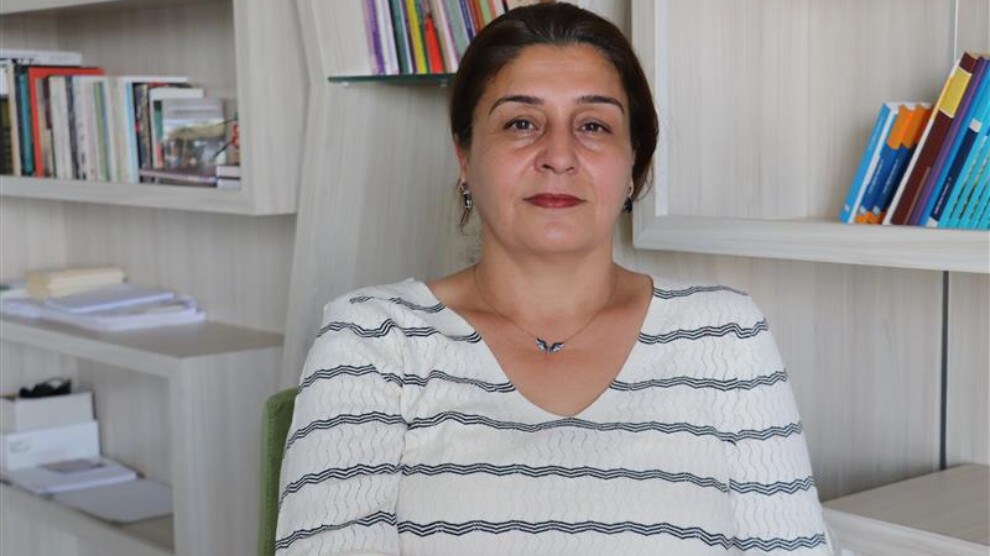Hülya Alökmen of TJA: A woman's cry for peace is for all women
“A woman’s cry for peace and her rights is not only for herself, but for all women in the world,” said Hülya Alökmen of the TJA, calling on Kurdish and feminist women to struggle for peace.

ARJÎN DİLEK ÖNCEL
Amed (Diyarbakır)- Women are always the first victims of war and conflict, being seen as a “means of taking revenge from the enemy”. In conflict zones, women are killed, raped, forced into prostitution and suffer from poverty.
Women having the deep scars of war in their memories for years, wage an honorable struggle for peace. Women struggle in many countries such as Colombia, Syria, Northern Ireland and South Africa to end war and conflict and start negotiation processes in their countries.
Following “The Call for Peace and Democratic Society” by Kurdish leader Abdullah Öcalan on February 27, 2025 and the dissolution and disarmament of the Kurdistan Workers’ Party (PKK), a peace process began to be discussed in Türkiye once again.
NuJINHA spoke to Hülya Alökmen, a member of the Free Women’s Movement (Kurdish: Tevgera Jinên Azad-TJA), about the solution of the Kurdish question, the role of Kurdish women in peace and negotiation processes and what kind of peace women demand.
The Republic of Türkiye has been shaped by policies of denial, assimilation and oppression, Hülya Alökmen told us, mentioning the massacres and rebellions in the history of Türkiye. “Women were the most affected by the Koçgiri rebellion (1921), the Sheikh Said rebellion (1925), and the Dersim massacre (1937-1938). The conflict started in the 1990s displaced thousands. Women were forced to leave their homes and villages and were estranged from their culture, language and identity. The displaced women faced persecution for being Kurdish and women.”
In the 90s, women were tortured and raped in custody, threatened and faced the forced village evacuations. “Many methods were used against women to intimidate women and society,” said Hülya Alökmen. “During that period, people were subjected to violence by the state so other forms of violence, such as child marriage, forced marriage and gender-based violence had a secondary importance. Despite everything, Kurdish women always demand peace.”
‘Kurdish women failed the policy of assimilation by resisting’
Kurdish women failed the policy of assimilation implemented by the Turkish state against the Kurdish people by resisting, Hülya Alökmen emphasized. “Kurdish women always preserve their culture no matter where they are. After the 90s, the quote from Kurdish leader Öcalan reading ‘A society can never be free unless women are free,’ was recognized by society. Women resisted because their spouses, sons, fathers and daughters were arrested or killed and they suddenly found themselves in the labor force while struggling against the policy of assimilation. In Rojava, women participate in all facets of life such as military, politics and decision-making positions. The Kurdish Women’s Movement has a long history of resistance.”
Hülya Alökmen also commented on the call of Kurdish leader Abdullah Öcalan on February 27 and the dissolution and disarmament of the PKK. “The call of Abdullah Öcalan has paved the way for peace. Women have welcomed this call because they see how Abdullah Öcalan struggles for women.”
One of the demands of the Kurdish people in this process is the release of all political prisoners, Hülya Alökmen highlighted, adding: “People expect a fair legal regulation for the release of political prisoners. Concrete steps should be taken to build peace in the country. In 2010 and 2011, the mothers of soldiers and the mothers of guerrillas came together and demanded peace. The state should take concrete steps for peace.”
Pointing to the role of women in peace processes, Hülya Alökmen said, “Women should participate in the peace negotiations with their own identity.”
The TJA organized a march in Amed on May 31, 2025 with the motto, “Women march for social peace and democratic solution”. Women from many cities of Türkiye and Kurdistan went to Amed and participated in the march for peace. “As women, we demand peace. Women should participate in all peace negotiations because women have the power to form a social network. Kurdish women and feminist women have been in solidarity with each other for years. They always unite to demand peace and struggle against femicide and gender-based violence.
‘Struggle is the only way’
“A woman’s cry for peace and her rights is not only for herself, but for all women in the world. We struggle because struggle is the only way for us. We have to struggle to build a better future for the next generations.”
